#Measham
Video
Matchbox - King Size Car Transporters by Darth Ray
Via Flickr:
Matchbox - King Size Car Transporters * Super King DAF Car Transporter (1971) * King Size "Farnborough Measham" Guy Warrior Car Transporter (1967)
#Matchbox#King#Size#Car#Transporters#King Size#Car Transporter#Transporter#Super#DAF#1971#Super King#Farnborough#Measham#Guy#Warrior#1967#Farnborough Measham#Guy Warrior#flickr
0 notes
Text
Vijftig jaar geleden: "Journey to the centre of the earth" (Rick Wakeman)
Journey to the Centre of the Earth, het derde album van Rick Wakeman, werd live opgenomen tijdens het tweede concert op 18 januari 1974 in de Royal Festival Hall in Londen.
Continue reading Untitled
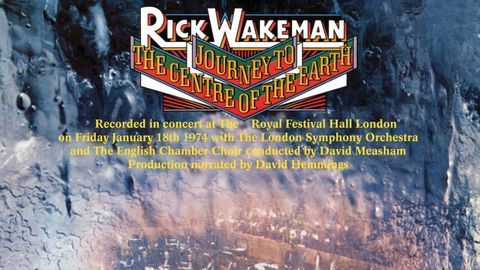
View On WordPress
#David Hemmings#David Measham#Jules Verne#Justin Hayward#Michael Doud#Ozzy Osbourne#Patrick Stewart#Rick Wakeman
0 notes
Text
Story Setting - Louis & Leila

The day begins with a note, tied to the back of my chair in the kitchen with coarse brown string. Louis/Leila isn't in their spot, and Lars tries to hide a grin behind his cup.
When I ask him for an explanation, his grin widens.
"Schemes," he says. "You'll have to figure it out."
I look again to the hastily scrawled note.
Find me.
And on the back,
Start at the beginning.
So, off I go. The others wash their hands of the matter, and Lars is wilfully unhelpful. The first clue is easy enough. I begin where we began, where we first met. The rest leads on from there.
--
Extrovert
The trail leads me all over town, through workshops, and gardens, even into the Town Hall at one point, much to Vyla's amusement. Around and around, winding over and under my previous steps. I find myself marvelling at the sheer effort that has gone into this. It must have taken them weeks to arrange.
By the midday bell, I'm beginning to tire. The day is warm, and the novelty of the chase soon gives way to the need to find shade. Luckily, the last clue leads me to respite.
Apple.
The orchards are lush and full, the late summer heat pleasant and mild beneath fruit laden trees, the breeze from the Mire cooling what intensity makes its way through the wealth of green.
--
Introvert
The trail leads me all over the house, through the storerooms, the garden, up the stairs and down, even into the shed, much to Mouse's consternation. Around and around, winding over and under my previous steps. I find myself marvelling at the sheer effort that has gone into this. It must have taken them weeks to plan.
By the midday bell, I'm beginning to tire. The day is warm, and the novelty of the chase soon gives way to the need for rest and refreshment. Luckily, the last clue leads me back to respite.
Food.
The kitchen is cool and quiet, the late summer heat unable to penetrate the thick stone walls, the high window above the sink allowing a gentle breeze from the Mire to further lessen the intensity.
--
Joint
And there they sit, nervously arranging the petals of a small blue flower till the light catches it just right. An intimate setting of pastries, cakes, and fruits await, just as carefully placed as the notes, as precisely planned as could be. All waiting for me to find, with the best of all possibilities right alongside.
Louis/Leila looks up. "How'd you like my hunt?" they ask, quickly scrabbling up to their feet, fidgeting with the creases of their shirt and the lay of their messy blonde hair. "I hope it wasn't too much of a bore."
"How could it be? I found my treasure," I say, hands outstretched and fingers reaching for them.
But Louis/Leila just shakes their head and gives me a smile so tender it makes my heart ache.
"No," they say, drawing me into their arms. "My treasure found its way to me."
---
Image courtesy of Andrew Measham on Unsplash
59 notes
·
View notes
Audio
Kendo Nagasaki - Hurt, Decide, Conspire - out today, debut album from “drums/trombone/drums” noise trio. Say no more!
For their debut album, drums/trombone/drums noise trio KENDO NAGASAKI bring us 11 tracks of improvised industrial noise, scattered drums & distortion drenched trombone riffs - all recorded live.
Kendo Nagasaki only ever record live. No overdubs. No pissing about. Just live, in the moment slabs of Class-A skronk.
Kendo Nagasaki are two drummers and a deranged trombonist with a pedal board the size of a small provincial town - creating blistering and bedazzling motorik soundscapes and improvisations that spring to mind the sounds of Soft Machine, Lightning Bolt, Boredoms, Parts & Labor, Sonic Youth, Benefits and The Comet Is Coming via a Marshall stack turned up to 11.
Previous releases have been with the Polytechnic Youth and Die Das Der labels, and they have been championed by Messrs Coe, Ravenscroft and Maconie. It's crazy, it's captivating and it's brilliant.
Mr Darleydale - Trombone
Mr Measham - Drums
Mr Droitwich – Drums
4 notes
·
View notes
Text
youtube
Wilfred Josephs - Symphony No. 5, Op. 75 "Pastoral": III. Adagio ·
Adelaide Symphony Orchestra · · David Measham
1 note
·
View note
Text
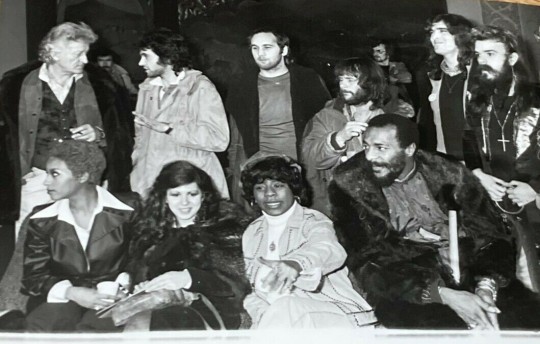
December 1973 - Press photo of different artists for live orchestral version of The Who's 'Tommy' staged at London's Rainbow Theatre.
Front row (L-R): Marsha Hunt, Elkie Brooks, Merry Clayton & Richie Haven.
Back row (L-R): John Pertwee, David Essex, Roger Chapman, Bill Oddie, Ronnie Charles & Roy Wood.
This Tommy version was recorded with the London Symphony Orchestra and the English Chamber Choir conducted by David Measham, with guest soloist appearances by Roger Daltrey, David Essex, Roger Chapman, Elkie Brooks, Graham Bell, Marsha Hunt, L'Anglo Mysterioso (George Harrison), Merry Clayton, John Pertwee, Roy Wood, Vivian Stanshall and Billie Oddie. [source]
🌟Very special thanks to Kim Robinson for id some of the people from the photo.🌟
Ebay.
#Marsha Hunt#1973 Marsha#actress#singer#model#writer#David Essex#The Who's Tommy#Tommy soundtrack#Marsha acting#Marsha singer#Marsha voice actress#Elkie Brooks#Richie Haven#Bill Oddie#Roy Wood#Tommy OST#London Simphony Orchestra#Roger Chapman#John Pertwee#Merry clayton#Ronnie Charles
8 notes
·
View notes
Note
Oh goodness so we’re technically the stalkers for over analyzing a pic that was made public but still none of our business….I’ll go back in my corner now. #meashamed I just saw the full pic that looked like someone took them while surrounded by greenery. I’ll go back to minding my business now. Lol
I mean, technically yes. If we want to be totally fair and transparent, we can’t even see the face of the man we’re all assuming is Chris. It looks like his hair color and go to style, but we can’t see his face and in reality it could really be someone completely different 😂🦎
4 notes
·
View notes
Text
Ink Black Heart research dump. I won't give away anything plotwise, these are just my notes on the references to other art and literature in the book, thought I would share.
Epigraph to Chapter Two: To My Own Heart by Maria Jane Jewsbury.
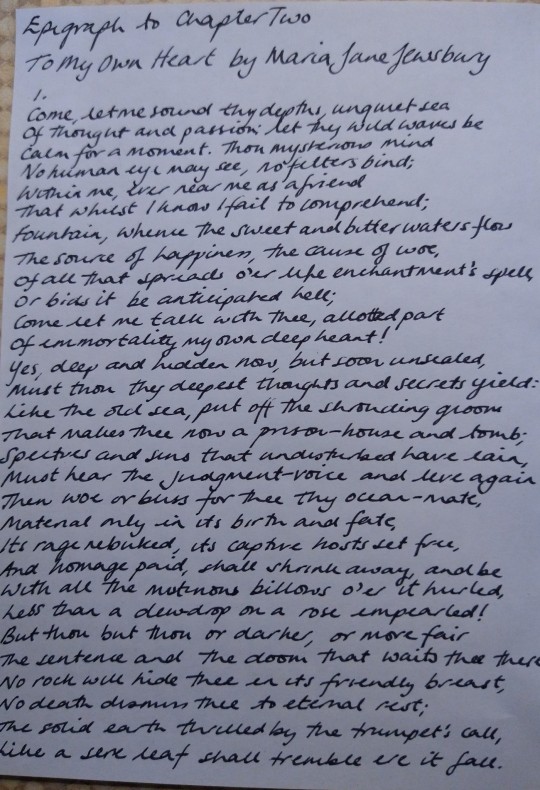
A very long poem with oddly mixed imagery and metaphor ... the heart as a fountain, a comrade, the sea, a tomb ... this is only the first third, it goes on for quite a bit longer and seems to conclude that people waste a lot of time on stupid stuff when they are young and foolish -
... aimless energies that bade the mind
Launch like a ship and leave the world behind.
MJJ was born 1800 in Measham (nowhere near Masham) Derbyshire and later her family moved to Manchester. She married a chaplain of the East India Company in 1832 and travelled to India, where she died of cholera in 1833. She corresponded with Wordsworth and her poetry was published newspapers and magazines. Sara Coleridge, great aunt of Mary Elizabeth Coleridge, was a friend.
4 notes
·
View notes
Text
Rick Wakeman - Journey To The Centre Of The Earth (Audiophile)
Mobile Fidelity Sound Lab – MFSL 1-230, Vinyl, LP, Album, Limited Edition, Remastered, 1995 US Audiophile Pressing
Side 1.
1. The Journey
2. Recollection
Side 2.
1. The Battle
2. The Forest
Credits:
Arranged By [Orchestra And Choir] – Danny Beckerman, Wil Malone
Art Direction – Michael Doud
Bass – Roger Newell
Choir – The English Chamber Choir
Conductor [Orchestra And Choir] – David Measham
Crew…
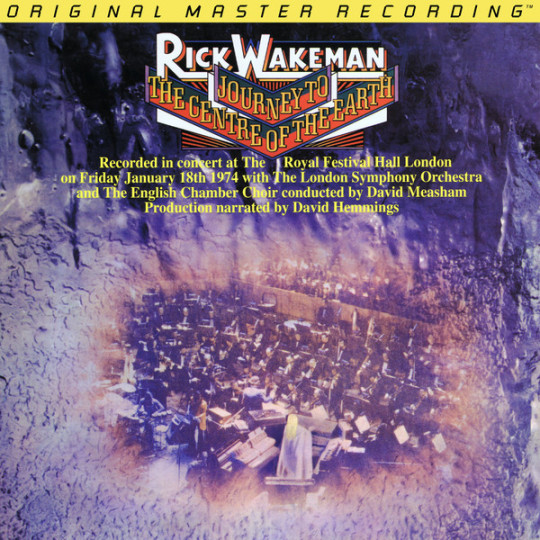
View On WordPress
0 notes
Text
NIGHT TIME ECONOMY SUMMIT 2024 @ ESCAPE TO FREIGHT ISLAND/MANCHESTER
I’ll be taking part in this years Night Time Industry Association annual Night Time Economy Summit 2024 which takes place at Escape To Freight Island in Manchester.
You can catch me alongside John Robb, Ellen Beth Abdi and Jeremy Pritchard on Friday 9th February at 2:30pm on the FAC Presents Where is Counterculture in 2024? panel.
Tickets are available from Universe
Full details of the event, speakers, panels and more below.
Night Time Industries Association Unveils Star-Studded Lineup for Night Time Economy Summit 2024
The Night Time Industries Association (NTIA) is proud to announce the full lineup of panellists and speakers for the highly anticipated Night Time Economy Summit 2024, set to take place on the 8th and 9th of February at the iconic Freight Island in Manchester.
This year's summit promises to be one of the most ambitious events yet, bringing together a diverse range of industry leaders, experts, and visionaries to explore and celebrate the significance of the Night Time Economy. Speakers include; Aitch B, Afrodeutsche, Andy Burnham, Bev Craig, Carly Heath, Danny Howard, Gok Wan, Philip Kolvin KC, Gary Powell, Jeff Smith MP, Jeremy Pritchard, John Robb, Kate Nicholls, Katouche, Keith Reilly, Kevin Hollinrake, Lapsley, Lewis G. Burton, Lisa Mafia, Maria May, Mirik Milan, Natalie Stewart aka Floacist, Ollie Ryder, Sam Divine, Sacha Lord, Ras Kwame, Rowetta, Wez Saunders, Sam Divine, Sarah Story, Suzanne Bull MBE, Yewande Adeniran, Yousef.
The summit will feature a momentous occasion as the Mayors of the North and West Midlands, Andy Burnham Mayor of Greater Manchester, Tracy Brabin Mayor of East Yorkshire, Andy Street Mayor of West Midlands & Steve Rotherham Mayor of Liverpool City Region come together to discuss the pivotal role of the Night Time Economy in their regions. This unique collaboration highlights the growing recognition of the sector's importance in driving economic growth, fostering creativity, and enhancing the overall quality of life.
Global perspectives will be shared by expert representatives from Japan, Europe, Australia, United States and Colombia, Michael Rodrigues NSW 24hr Commissioner, Tak Umezawa Tolyo NTE Association, Ariel Palitz Former NTE Advisor and Camilo Ospina Guzman President of Asobares Colombia, providing valuable insights into the latest global initiatives shaping the Night Time Economy landscape. The summit will also hear Keynotes from the Under Secretary of State & Minister for Small Medium Enterprise businesses, Kevin Hollinrake, and Philip Kolvin KC, who will shed light on the “Darkest Before the Dawn” NTIA Manifesto, addressing considerations and initiatives which will enhance and develop the night time industries in the future.
Attendees can immerse themselves in two days of expert discussions on the electronic music industry, courtesy of DEFECTED Records, covering topics from artist development and publishing to public relations and A&R. The Fair, a leading curator of over 100 independent events per year, will assemble some of the industry's best minds to tackle the challenges of modern-day events and festival curation.
With our International Stage hosted by VibeLab, bringing some of the leading voices together from across Europe and Globe speaking about the some of the global approaches to Nightlife including Robbe Van Bogaert Human Power & Speaker, Luis Manuel Garcia Mispireta, Associate Professor of Ethnomusicology, Richard Akingbehin Founder of Refuge Radio, Aoife McGuiness Neuroscientist, Multi Sensory Researcher, Professor Fiona Measham The Loop, Opposhain Ghosh, Andreina Seijas Kenneth Bailey & Anna Sclimm plus many more.
Exclusive interviews will take centre stage, featuring Keith Reilly, the founder of Fabric, and the incredible Gok Wan, Plus a Surprise Special Guest on Stage 2 Day 2 with Wez Saunders CEO of Defected Records, who will share his remarkable journey from fashion icon to electronic music DJ.
Adding to the excitement, the summit will witness the launch of the Electronic Music Report 2024, generously supported by Amazon, providing an in-depth analysis of the industry's latest successes and trends. Additionally, the benchmark Night Time Economy Report 2024 will be unveiled, offering a comprehensive look at the current patterns and trends from 2023, providing invaluable insights into the future of the UK night time economy. We will also be hosting a New Workshop Stage which will deliver key Academic Papers from Researchers and Academics from across the world, plus consumer marketing insights and the development of AI within the Night Time Economy.
With over 200 speakers and support from key industry players such as the DEFECTED, Home Office, NACTSO, Mustard Media, Department of Business and Industry, The Fair, Skiddle, Ticketmaster, Toolroom, Hospital Records, VibeLab, UKH, BBPA, Pioneer, ATC, Beatport, TikTok, Institute of Hospitality, Japan NTE Association, Institute of Licensing, Gig Pig, NDML, AGF, Listen for Life, The Loop, Earth Percent, MVT, Featured Artist Coalition, UK Music, Morning Advertiser, DJ Magazine, UKCMA, Asbares, Showsec, Carbon Literacy, SIA, Drinkstrust, PRS Foundation, Arts Council, Help Musicians, Attitude is Everything, shesaid.so and many more, this year's Night Time Economy Summit promises to be a phenomenal and groundbreaking event. Don't miss the opportunity to be part of the conversation that will shape the future of the Night Time Economy
NTES 2024 Speakers (A-Z)
Abel Reynolds - Adrian Perret – Afrodeutsche – Alex Claridge - Ali Turnham - Amber Davis - Amelie Maurice Jones - Andrea Baptiste - Andy Burnham - Andy Frank - Andy Raeside – Anna Sclimm - Anjali Prahsar Savoie - Ariel Palitz - Arts Council - Atheer Al Salim - Aitch B - Bev Craig - Ben Newby - Camilo Ospina Guzman - Carly Heath –Caroline Clift - Cathy Runciman - Charlotte Maynard - Ch.Insp Jonathon Waterfield - Chris Goss - Chris Hawkins - Chris Lee - Chris Simpson - Christina Vale Pires –Claire O’Neill - Cristina Vale Pires - Dan Davies - Danny Claire - Danny Howard - Dean Acreman - Deborah Hewitt - Dims Netherlands - Dr Adam Behr - Dr Mathew Flynn - Duncan King - Ed Gillett - Eimer Deane - Ella McWilliams - Ellen Beth Abdi - Emma Mcklarkin - Finlay Johnson - Fraser Swift - George De St Mars - Georgia Green - Gerry Parker - Gok Wan - Grace Flynn - Graeme Park - Griff Harding - Guy Jones - Harriet Grace - Helen Valente - Help Musicians - Holly Lester - Hope Nolan - Ise Murphy - Ian Graham - Ian Haworth - Jason Dolman - Jeff Smith MP - Jen Mackley - Jenn Nimmmo Smith - Jeremy Pritchard - Joe Frankland - Jody Clark - Jorge Meehan - Jordan Ford - Julie Tippins - Kamila Rymajdo - Karl Klub Verboten – Katouche - Kate Nicholls - Kate Osler – Katy Porter - Keith Reilly - Robert Shepherd - Kenneth Bailey - Kevin Hollinrake –Kira Ashwin - Kitty Amor – Lapsley - Latoya Reisner - Lauren Down - Lawrence Barton - Leo Charalambides - Lindsay McIntyre - Lisa Baskott - Lisa Lashes - Lisa Mafia –Lyle Bignon - Lucy St John - Luke Fletcher MS - Maia Jessica Barker - Manu Naykene - Maria May - Mark Burtonwood - Mark Lawrence - Mark Logan - Martin Nicastro - Mary Jane - Megan Townsend - Megan Wallace - Michael Kill - Michael Rodrigues - Michelle Russell - Mike Grieve - Mike Linell - Miles Shackleton - Mirik Milan - Moe Choucair - Natalie Stewart - Natalia Szczepanczyk - Natasha Rymajdo - Nick Morgan - Nina Kehegia - Ojay Mcdonald - Olha Udivenko - Ollie Gardiner - Olli Ryder - Oli Hackett - Oposhona Ghosh - Pat Plummer - Patrycja Rozbicka - Pauline McNeill MSP - Phillipa Clifford Jones - Philip Kolvin KC - Phoebe Roberts - PRS Foundation - Prof. Alice O’Grady - Prof. Ewa Mazierska - Prof. Fiona Measham Prof. Koos Zwaan - Prof.Sam Parsley – Ras Kwame - Ricky Oscroft - Rob Adamson - Robert Richardson - Robbie Ashdown - Rory Palmer Rowe – Rowetta - Sacha Lord - Satia Rai - Sarah Clover - Sarah Crane -Sarah Moxom - Sarah Slater - Sarah Story - Seanie T - Silvana Kill – Silvia Montello - Salma Repa - Sophia Wardman - Steve Rotherham - Steven Braines - Sunil Sharpe - Suzanne Bull MBE - Sylvia Oates - Tak Umezawa - Tamsin Embleton –Tom Devine - Tom Kiehl - Tony Hogan - Tony Rigg - Tracy Brabin - Vick Bain –Wez Saunders - Will Stevens - Yuri Dokter - Yewande Adeniran
A Multifaceted Experience Across Four Riveting Stages:
Main Stage: A convergence of leaders from major cities, governance bodies, central government, and global night time economy experts. Topics include urban safety, cultural enrichment, economic sustainability, and technology's role in enhancing the nocturnal experience.
Stage 2: Hosted by Defected Records, it will explore crucial aspects of the electronic music industry, including management strategies, the role of agents, trends in publishing, effective promotional techniques, and the evolving landscape of record labels.
Stage 3: Partnering with VibeLab, day 1 on Stage 3 will highlight innovations in safety, ergonomics, communication, data management, and advocacy, fostering a safer and more efficient global nightlife experience. On day 2, the stage will be hosted by We are the Fair, delving into the challenges faced by independent festivals, exploring solutions, sharing best practices, and advocating for policies that support their sustainability within the Night Time Economy.
Stage 4: Focused on Advocacy, Accessibility, Diversity, Inclusion, and Sustainability. It will explore strategies for making the night time economy universally accessible, championing diversity and inclusion, and promoting sustainability.
As a beacon of innovation, the summit will feature insights from government officials across the UK, including the esteemed partnership of Greater Manchester Combined Authority. Our global network will serve as a bridge, connecting experts worldwide for unparalleled international cooperation and knowledge exchange.
Michael Kill, the dynamic CEO of the Night Time Industries Association, exclaims, “With the unveiling of the complete roster of speakers and panellists for the summit, the Night Time Economy Summit 2024 stands as the pinnacle of worldwide cooperation, bringing together intellects from diverse realms within the nighttime landscape. Manchester is poised to transform into the focal point of a groundbreaking interchange of ideas poised to mould the trajectory of our industry's future.”
Andy Burnham, Mayor of Greater Manchester:
“We are delighted that the NTIA’s Night-Time Economy Summit will be coming to Greater Manchester in February 2024. We look forward to building on the success of this year's event in London, and recognising the hard work and amazing representation that the trade association delivered throughout the pandemic for the hospitality and night time economy sector across the UK.”
Sacha Lord Night Time Economy Adviser, Co-founder The Warehouse Project/ Parklife
“Throughout the Covid period, the NTIA became the biggest voice for nightlife across the UK, so much so, it was an honour when I was invited to become Chair. I’m delighted they have decided to uproot and choose Greater Manchester for the next Summit, in 2024. It will be the biggest to date, in a city region where it has been said, tables were made for dancing on.”
Partners: VibeLab / Defected Records / The Fair / Ticketmaster / NDML Insurance / Skiddle / Mustard Media / GigPig / Mustard Media / Amazon
The Night Time Economy Summit 2024 isn't just an event; it's a movement. A convergence of professionals, enthusiasts, and policymakers, it promises an unmatched platform for idea exchange, networking, and groundbreaking innovation. Join us in Manchester at Escape from Freight Island for an experience that transcends boundaries.
For media inquiries or tickets please visit the following website:
www.nighttimeeconomysummit.com
0 notes
Text
Database of Drug-Related Festival Deaths Needed to Save Lives - Technology Org
New Post has been published on https://thedigitalinsider.com/database-of-drug-related-festival-deaths-needed-to-save-lives-technology-org/
Database of Drug-Related Festival Deaths Needed to Save Lives - Technology Org
A study led by the University of Liverpool has called for the introduction of a national database of drug-related medical incidents at UK music festivals to evaluate support services, improve safety and reduce the risk of drug-related deaths (DRDs).
Various medical pills and tablets. Image credit: Myriam Zilles via Unsplash, free license
The exact number of DRDs at UK music festivals in recent years is unknown as there are currently no standard processes for reporting or accessing data on medical incidents at these events.
This lack of a centralised, publicly accessible system for festivals to report drug-related medical incidents hinders festival organisers and support services when monitoring trends in drug-related harm and assessing the effectiveness of interventions.
Without a real-time reporting system for drug-related harm during festivals, potential opportunities are missed for preventing harm to others, such as warnings to drug-using communities about adulterated illicit drug markets.
Given that inquests often take months or even years to determine the cause of death, new research published in Drug Science, Politics and Law calls for a transparent database to compare drug-related harm within and across festivals in real-time to increase opportunities for intervention which could prevent death.
Through cross-referencing media and social media with a national database provided by coroners and communications with bereaved families and associated organisations, this research identified that, between 2017 and 2023, there were 32 potential DRDs at festivals, with 18 confirmed. Three of these deaths were of individuals under the age of 18. On average, there are five or six festival DRDs each year in the UK.
16-year-old David Celino died at Leeds Festival in August 2022 after taking high-strength ecstasy tablets. While reported at the time as an “isolated incident,” there was another DRD the same weekend and an alert was issued for similar high strength tablets by a drug testing service at a different festival.
At David’s inquest, the coroner called for greater oversight of drug-related harm at UK festivals which the introduction of a festival-specific database would ensure.
It is estimated that up to 87% of festival attendees have tried illegal drugs in their lifetime, more than twice the prevalence rate (36%) of young adults in the general population. This means that, as drug consumption is more likely at festivals, adequate oversight is necessary to prevent drug-related harm.
Professor Fiona Measham, Chair of Criminology at the University of Liverpool said: “Our research has shown that there is a small but significant number of drug-related deaths at UK music festivals each year. It is clear that more needs to be done to reduce drug-related harm, to ensure that everyone can enjoy festivals safely and to prevent any other parents hearing the heart-breaking news that their child won’t be coming home.
“While our research has shed light on the issue, currently we’re in a situation where we don’t know the definite number of drug-related deaths at festivals. This makes it extremely difficult for everyone to understand whether the situation is getting better or worse and whether festival health initiatives such as drug checking services, amnesty bins and medical services are effective.
“What we do know is that people are more likely to take drugs at festivals than elsewhere and drug markets are especially unpredictable at the moment, with risk of overdose or poisoning from synthetics. Introducing a transparent, real-time publicly accessible database of drug-related harm across festivals would provide a comprehensive picture of the extent of the issue and whether or not on-site festival support services are effective.
“If we can warn people about dangerous substances in circulation and prevent overdoses and poisoning happening in the first place, not only do we reduce DRDs and parents avoid the heartbreak of bereavement, it eases the pressures on the NHS and health services around these events.”
Source: University of Liverpool
You can offer your link to a page which is relevant to the topic of this post.
#2022#2023#communications#comprehensive#data#Database#drug#drug overdose#drugs#Events#Featured life sciences news#festivals#Health#Health & medicine news#Health care#hearing#heart#Ideas#incident#it#law#LED#Light#Link#media#monitoring#Music#News#Other#picture
0 notes
Text
0 notes
Text
Officers warn about potential dangers of overtaking as driver sentenced
Officers warn about potential dangers of overtaking as driver sentenced
Officers have warned about the potential dangers of overtaking while driving after a 79-year-old woman was left with serious injuries following a head-on collision.
Sajid Mahmood, 53, of Burton Road, Branston, Burton-on-Trent, was driving a taxi – a Peugeot car – along Swepstone Road, Measham, on the afternoon of Friday 24 September 2021 when he attempted to overtake a tractor with an attached…

View On WordPress
0 notes
Audio
Kendo Nagasaki - LIVE 01.09.22
Drums + Trombone + Drums noise trio.
Kendo Nagasaki only ever record live. No overdubs. No pissing about. Just live, in the moment slabs of Class-A skronk.
Mr Darleydale - Trombone
Mr Measham - Drums
Mr Droitwich – Drums
5 notes
·
View notes
Text
youtube
Wilfred Josephs - Requiem, Op. 39: I. Requiescant ·
Robert Dawe · Adelaide String Quartet · ·
Adelaide Symphony Orchestra · Adelaide Chorus · David Measham
1 note
·
View note
Text
According to Howard s. Becker, why do marijuana smokers enjoy using the drug?

Transcribed image text: According to Howard S. Becker, why do marijuana smokers enjoy using the drug? a. They enjoy provoking disapproval in others. b. They are covering up or trying to escape some other deviant tendencies. c. They are genetically predisposed to enjoying its effects. d. They engage in a social process of learning to define the experience as fun and pleasurable. QUESTION 31 If we apply the sociological imagination to sex, gender, and sexuality, we might argue that: a. men and women are at opposite ends of the psychological continuum, which leads them to have distinct styles of communicating, feeling. and acting. b. Men and women are different biological organisms, and these differences manifest themselves in the ways men and women behave. C. The social patterns we see highlight natural differences between men and women, differences that set men and women on different pathways from birth d. Although biological differences exist between men and women, what we make of those differences is socially constructed and has changed through time and place.
An impressive piece of the present humanistic examination on sporting medication use is (expressly or verifiably) enlivened by Howard Becker's traditional model of freak vocations. The point of the current paper is to straightforwardly apply Becker's hypothesis to exact information on present-day pot use and to recommend a modification of the hypothesis. As a feature of this, we propose a stretch of the humanistic methodology addressed by Becker and supporters to incorporate sporting medication use, yet in addition use for which youngsters have looked for treatment. The paper depends on 30 subjective meetings with youngsters in treatment for pot issues in Copenhagen, Denmark. We propose an update of Becker's profession model corresponding to four perspectives: inception of pot use, separation between socially incorporated and individualised, deteriorated use, social control from non-clients, and the clients' ethical position on marijuana. An essential issue of the paper is that social collaboration may both spur weed use, as Becker proposed, and act as a defensive component against broad, tricky use.
Presentation
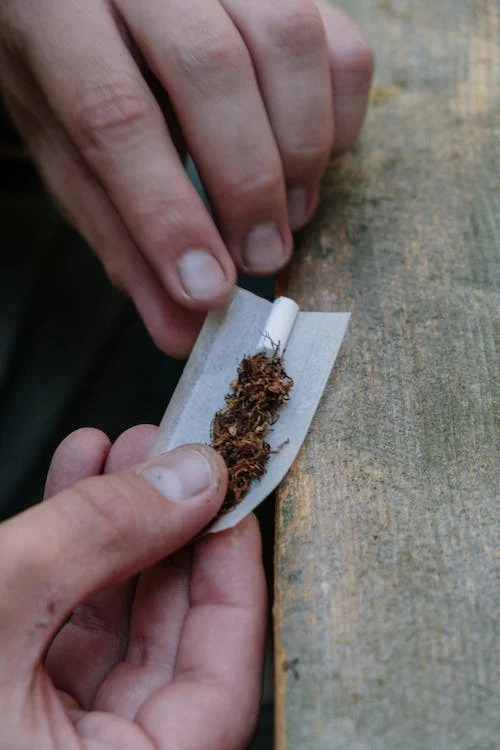
The point of this paper is to propose a correction of Becker, 1953, Becker, 1955-1956, Becker, 1973 hypothesis on freak professions to apply it to introduce day marijuana use - the motorcade illustration of abnormality utilised by Becker. Becker's (1953) way breaking commitment stressed social level clarifications of pot use; to become normal weed clients, individuals must be related with subcultural networks that changed their way of behaving, attitude and moral position on drugs. We utilise Becker's hypothesis in an examination of youthful pot smokers in Copenhagen, Denmark, who have looked for treatment for their marijuana issues. Like Becker's review, this paper focuses on the significance of social level clarifications, yet rather centres around friendly connection as a component that may both move intermittent marijuana use and upset inordinate use.
Becker's work is in many cases used to highlight two central issues. In the first place, inside investigations of abnormality, that individuals who digress from the standards of customary society are not 'exceptional sorts of individuals', yet that aberrance is the consequence of cycles of social communication and socialisation. Furthermore, inside examinations on drug use, that weed use - or other medication use - isn't guaranteed to prompt tricky use and compulsion, however it can be a controlled action. This view has enlivened a lot of subjective examination into unlawful medication use, especially since the mid 1990s, and particularly in the UK. The writing on sporting party drug use centres around drug consumption as "determined gratification" (Featherstone, 1991) or "controlled loss of control" (Measham, 2004), depicting drug clients as judicious gamble chiefs surveying their substance use as practical and viable with different parts of their life (Hutton, 2006, Malbon, 1999, Measham et al., 2001, Measham et al., 1994, Parker et al., 1998, Sanders, 2005, Williams and Parker, 2001). Profoundly compelling in this custom is Parker and partners' work recommending a standardisation of sporting medication use (Measham et al., 1994, Parker et al., 1998). As indicated by Parker et al. (1998), "reasonable", unproblematic medication use has turned into a socially obliged movement and part of a 'practice work-life balance' way of life rehearsed by conventional young people. While the standardisation postulation is as yet discussed (see for example Aldridge et al., 2011, Measham and Shiner, 2009, Shildrick, 2008), the emphasis on sporting medication use as a controlled action has for a huge part been kept up with (in any case, see for example Järvinen and Ravn, 2011, MacDonald and Swamp, 2002, Shildrick, 2002 for exemptions for this).
Contrasted with the great measure of studies examining sporting party drug use, subjective investigations of weed use are more inadequate (for example Amos et al., 2004, Chime et al., 1998, Fletcher et al., 2009, Haines et al., 2009, Hathaway et al., 2011, Sandberg, 2012, Shukla and Kelley, 2007). These investigations address a scope of hypothetical methodologies. A few researchers utilise a subcultural viewpoint, contending that marijuana societies ought to be viewed as an assortment of customs, stories and images that oppose greater part standards (Golub, 2005, Sandberg, 2012, Sandberg and Pedersen, 2010, Shiner, 2009). Other subjective specialists break down the social setting and significance of marijuana use and the clients' character advancement, without binds this to unequivocal subcultures (Ringer et al., 1998, Hathaway et al., 2011), additionally focusing on the significance of orientation, social class and identity for the clients' weed professions (Fletcher et al., 2009, Haines et al., 2009). Moreover, an arising writing centres around navigation and medication use (for example Shukla and Kelley, 2007), breaking down pot clients as objective specialists deciding to involve drugs as long as the advantages (joy, unwinding, friendliness) offset the expenses (cost of medications, wellbeing gambles and so on.).
A critical piece of this writing - on sporting party drug use as well as sporting pot use - is enlivened by Becker's (1953) hypothesis on abnormality. Nonetheless, the hypothesis is ordinarily alluded to rather quickly and only sometimes put to efficient scientific use (exemptions are Gallstones (2002) and Hirsch, Conforti, and Graney's (1990) concentrates on which we return to beneath). In spite of much past examination, the point of the current review is 1) to straightforwardly apply Becker's model of degenerate vocations to experimental information on present-day weed use among youngsters and to propose a modification of the model. One more point of the review is 2) to extend the humanistic methodology addressed by Becker and supporters to incorporate sporting as well as tricky medication use, for example use for which youngsters have looked for treatment. In spite of the fact that we share the view addressed by the custom exuding from Becker that pot use is frequently controlled and without serious long haul ramifications for the clients, our concentrate likewise addresses the more tricky parts of medication use. Consequently, we will show how Becker's consecutive model doesn't need to stop at the degree of normal, controlled use yet might be reached out to incorporate "exorbitant" use, and we contend that this development of the hypothesis gives new bits of knowledge into pot vocations thusly.
While moving toward weed use as a type of "aberrance" (Becker, 1953, Becker, 1973) a significant note ought to be made. In the present Denmark, as in numerous other Western nations, marijuana possesses a totally different situation than it completed a long time back when Becker planned his hypothesis. In the first place, pot is effectively accessible. As per study information, 80% of the 18-19 years of age Danes say they could undoubtedly purchase weed in the event that they needed to (Østergaard, Røgeskov, and Rasmussen, 2011). Second, use is somewhat inescapable: 38% of 15-24-year-olds report they have attempted marijuana something like once (EMCDDA, 2012). Also, among youngsters in Denmark, trial and error with marijuana is by and large viewed as adequate; standard use, then again, is encircled by regrettable mentalities (Järvinen and Demant, 2011). On a political level, the city of Copenhagen deals with a controlled legitimization of pot, to some degree roused by The Netherlands and, most as of late, the sanctioning of marijuana in the territories of Colorado and Washington, USA in 2012. While these models are as yet irregular on a global scale, they represent the changed place of pot from being a medication on the edges of society to being a pretty much acknowledged drug in certain nations. These progressions are clearly significant for the conceptualisation of the vocation arrangements that weed clients travel through and are consequently remembered for our endeavours to apply Becker's hypothesis to observational information.
In the accompanying, we present Becker's vocation model and the couple of studies that expressly utilise his hypothesis on observational information to examine its pertinence. After this, we frame our own methodology.
Becker (1953) was one of the first to break down drug vocations as a social cycle, focussing, not on the medication clients' very own qualities but rather on a bunch of changes in their calculated and experiential relationship to pot, created in friendly connection with others. Becker portrayed three requirements during the time spent turning into a marijuana smoker: a) figuring out how to smoke pot in the correct manner, b) figuring out how to perceive the impacts of the medication, and c) figuring out how to partake in these impacts. His contention was that the inspiration to participate in marijuana use isn't guaranteed to go before trial and error with pot yet follows from a subcultural educational experience where the individual is associated into specific ways of behaving and perspectives (Becker, 1953, p. 242). In this cycle weed smokers figure out how to partake in the medication as well as to see pot use as ethically adequate. Becker, 1955-1956, Becker, 1973) portrayed three phases of weed use: the novice (the stage where the person "figures out how to turn into a pot client", cf. focuses a, b, and c over); a periodic client whose weed smoking is irregular, and the ordinary, orderly marijuana client. The movement starting with one phase then onto the next is socially moulded, as per Becker (1973): without coordination into an organisation of clients, and without a relaxing of the connections to regular society, clients don't continue in their "freak" professions.
Becker (1955-56) attached the phases of client vocations to social control, estimating that different sorts of social control become dynamically less powerful as clients move starting with one phase then onto the next. One sort of control is connected with supply: to progress from the fledgling stage to an intermittent and customary stage, clients need to track down additional steady causes of supply than chance experiences with different clients. A second sort of control concerns the need to keep non-clients uninformed about one's medication use due to possible negative responses or approvals. This mystery is many times kept up with through an adjustment of the clients' social cooperation. The relationship with other medication clients is increased simultaneously as contact with non-clients is kept at least. A third sort of control is connected with the clients' originations of marijuana smoking as (im)moral conduct. At the point when marijuana clients move from intermittent to customary use, they foster what Becker calls a "more liberated view" on the medication, for example characterising the impacts of marijuana as more gainful than unsafe and viewing pot as a more secure medication than liquor and tobacco. Some portion of this is likewise the conviction that "booked" use is un-dangerous use: as long as clients switch back and forth among use and non-use (at points of time when use is felt to be improper or when they choose to have some time off), they commonly feel "in charge" of the medication (Becker, 1955-56, p. 41-42).
Becker's Commitment
Howard Becker's Outcasts was not quite the same as whatever preceded it; its position addressed an extreme takeoff from the field's prevailing etiological and pathology direction. Becker refined and related to his subjects-his "degenerates": He was a weed smoker and a jazz performer himself; in the mid sixties, not very many abnormality sociologists had the very personalities they researched. Becker put away pathology and aetiology — the "For what reason do they make it happen?" and the "How might we inspire them to stop?" questions and high level an altogether unique line of request: How is flightiness characterised and authorised by the general public, how does the deviator achieve its sanctioning, and with what outcomes?
Outcasts reconceptualised the social science of aberrance; as a matter of fact, it practically made a field of study. Also, it was a colossal achievement; the book has been reproduced in excess of multiple times. Of the almost 40,000 references to Howard Becker's work in Harzing's Distribute or Die, very nearly 15,000 are to Outcasts alone, and some of the others are to the articles that the writer consolidated as parts in the volume. Among its requests, the methodology of the book mixed the idea of social relativity with a blossoming sixties taste for something delectably unusual. Furthermore, it engaged the developing propensity with respect to youthful educators of social science who partook in marijuana and consequently, became entranced fair and square.
1 note
·
View note